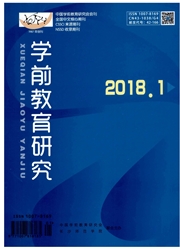

 中文摘要:
中文摘要:
采用半结构化访谈法、问卷法和现场观察技术,本研究初步探讨了幼儿心理状态理解能力发展视角下的师生对话交流质量的结构和现状,结果发现幼儿园教师在理解师生沟通的本质、掌握基本的交流原则和技巧方面有比较准确的认识;师生之间的交流涉及到一些与儿童心理状态理解能力发展密切相关的因素,如情感和情绪状态的理解、矛盾冲突的解决、心理状态语言的使用等,这些因素在实际教学中也表现出了一定的特点。心理状态理解能力的获得与发展是儿童社会性认知发展的重大进步,教师应把促进幼儿心理理论能力的发展作为重要的教育目标之一,有意识地设置促进幼儿同伴交往的情景,并有意识地使用一些心理状态术语和表达自己或他人情感状态的词语与幼儿进行对话交流,帮助他们理解他人的意愿和想法,促进其心理理论发展。
 英文摘要:
英文摘要:
This research used semi-structured interview, questionnaire and field observation technique to primarily explore the structure and quality of teacher-child verbal interaction's influence on children's development of the ability of understanding others' mental states. It was found that most kindergarten teachers comprehended the nature of communication between teacher and child and mastered the basic principles and techniques of communication. Factors such as understanding the emotional states, solving conflicts and using mental state language during the interaction were closely related to children's theory of mind. Teachers should be aware of the importance of the development of theory of mind ability to children, and intentionally train children in the field.
 同期刊论文项目
同期刊论文项目
 同项目期刊论文
同项目期刊论文
 期刊信息
期刊信息
